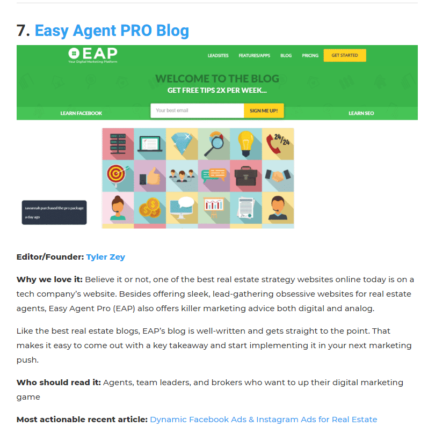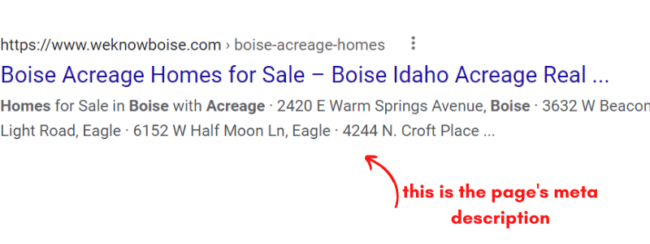The SEO glossary every new real estate agent needs
Struggling to get your website to show up on the first page of search engines like Google? If you're new to real estate, or new to SEO, this real estate website SEO guide is sure to help!
If you don’t have a spiffy new real estate website, you’ve skipped a step in your reach for the top in the real estate industry. An online presence is a must for real estate agents and a real estate website should be one of the first purchases you make when you learn you’ve passed the license exam.
No, getting started in the business isn’t cheap. This is why you may want to learn all you can about SEO to gain organic traffic for that new website.
To help you out, we’ve compiled a glossary of some of the most common SEO terms that befuddle new agents.

You may hear this term also referred to as “alt attributes.” Short for “alternative text,” it is text used “… within an HTML code to describe the appearance and function of an image on a page,” according to SEO specialists at moz.com. Alt text describes an image if it fails to load properly.
Typically one or two sentences in length, alt text is important for your real estate website SEO in that it “… can influence the content for which search engines consider a website to be relevant,” claims the moz.com website. They also suggest that the alt descriptions should contain the search terms “… for which the website is optimized.”
Here’s an example of how you might use alt text on a neighborhood page:

Arnas Goldberg, CC BY 3.0, via Wikimedia Commons
For this photo, the alt text may look like this: <img src=”Kings Landing.png” alt=”Homes in the Kings Landing neighborhood in the Seven Kingdoms”>
Learn more about alt text at moz.com.
“… link building is one of the countless critical factors for boosting your search engine rankings in the eyes of the Google Gods,” according to Julia McCoy at semrush.com.
In a nutshell, anchor text describes the words you choose when including a link in your text, as part of your real estate website SEO. For example, Easy Agent PRO blog is anchor text. “Semrush.com” in the paragraph before this, is also an example of anchor text.
So, what does this have to do with real estate website SEO?
Google’s algorithms uses anchor text to glean the topic of the content on the page. Also, anchor text, according to McCoy, “… tells your readers what to expect before they click the link. Anchor words are THE promise about what is on the other side of the link, so they must be highly relevant.
To start, one ranking metric that Google employs is link relevancy. Huh?
“… how related the topic of page A is to page B if one links to the other. A highly relevant link can improve the likelihood of both page A and page B ranking for queries related to their topic,” the pros at moz.com state.
Also known as inbound links, backlinks are those that link from another website to yours.
For example, the folks at theclose.com chose Easy Agent PRO’s blog among the best real estate blogs “to make you a better agent in 2021.” They linked to us from their review:

Our name, in blue at the top of the review, is an example of a backlink – and backlinks are very good for your real estate website SEO.
Some, in their efforts to increase SEO, go about deliberately building backlinks, a process that Neal Patel says can backfire. Because “not all backlinks are created equal, … You can use link building to increase your website’s rankings. You can also use it to decrease your rankings and hurt your domain authority,” he cautions.
Learn more about backlinks and Patel’s strategies at nealpatel.com.
Let’s imagine homebuyers landing on your website. Some may leave immediately, or after scrolling through the home page. Others may click on a link in the nav bar. Some go to the neighborhood section while others are interested in learning more about you.
Those that bailed help determine your bounce rate. It is the percentage of those visitors who didn’t take another action after landing on a page on your site.
Duplicate content is, simply, content that appears, in identical form, on more than one website or on the same website.
Although many real estate website SEO newcomers believe there is a Google “penalty” for duplicate content, there isn’t. But duplicate content can hurt your SEO efforts in another way.
“… search engines will rarely show multiple versions of the same content, and thus are forced to choose which version is most likely to be the best result. This dilutes the visibility of each of the duplicates,” according to the SEO pros at moz.com.
Think of header tags as the title of your blog post (heading1, or H1) and then the sub-headers sprinkled throughout (heading 2, or H2)
For example, in this blog post, the H1 is the title, or “The SEO glossary every new real estate agent needs.”
Each sub-heading, which we’ve bolded (such as the one above, “Header tags), bears an H2 tag.
Header tags not only give structure to your blog post, helping readers find what they need, but they also provide “… keyword-rich context about your content for the search engines,” according to Amelia Willson at searchenginejournal.com.
Image compression (resizing images) helps speed up the loading of a web page, thereby indirectly impacting SEO.
An internal link is a link on your site that links to another page on your site. For instance, did you know you can find loads of SEO tips for real estate agents in Easy Agent Pros blogs?
The text in blue in the previous sentence is an internal link, pointing to another blog post which gives additional SEO tips.
Sounds like no big deal, right? Jason Hardwick, at ahrefs.com, begs to differ:
Internal links “… are crucial to SEO success.”
He goes on to mention a case study to prove his point. Check it out at ninjaoutreach.com.
Then, get busy building your internal link structure by checking out Neil Patel’s “7 Internal Linking Strategies That Will Boost Your Content Marketing SEO.”
What you enter into a search box on Google or any other search engine are keywords.
For example, suppose I’m looking for a home for sale in Anytown. I want to start my search in a particular neighborhood, Sage Creek. I most likely would type “houses for sale in Sage Creek Anytown” into Google’s search box.
This keyword string, by the way, also passes as a “local query” and as “long-tail keywords.”
It’s one thing to search for “homes for sale” and quite another to search for “homes for sale in Boise” or, even better, “homes for sale on acreage in Boise.”
The more specific searchers get with their keywords, the longer they become. Thus, the long-tail keyword, which is every real estate agent’s best friend.
Why?
You do understand that the chances of your site showing up on page one for keywords such as “homes for sale in Long Island” or “houses for sale in Miami” are slim to none, right?
Long-tail keywords, on the other hand, “… are usually much easier to rank for than general keywords,” claims Sergio Aicardi at semrush.com.
The bonus is that the audience that Google delivers to your site for these terms is most likely filled with warmer leads. At the very least, long-tail keywords tend to deliver a more targeted audience.
Learn how to find the right long-tail keywords at yoast.com and neilpatel.com.
The text you find under the link in a search engine result is the meta description. Here’s an example:

It can be anything you want it to be, but it should be a short description of the page or the site. To use such valuable real estate for your company’s address is rather unwise. There are so many other keyword-rich descriptors they could’ve used here.
Typically used in the phrase “organic search results,” organic is the opposite of paid search results.
Short for “search engine optimization,’” SEO “… is the process of making your site rank as high as possible in Google when someone …” performs a search for your real estate keywords.
Learning real estate website SEO tactics can present a steep learning curve to the newbie. It can be frustrating as well because SEO is ever-changing.
Short for “search engine results page.” It’s the page you land on after entering a search term.
Naturally, this is just the bare-bones minimum amount of definitions you can find on various aspects of SEO, but these terms are the most commonly misunderstood to new website owners.
Is there one real estate website SEO technique that is more powerful than others? Loren Baker at searchenginejournal.com claims that one of the most common answers to that question is “Well, it depends …”
Thankfully, he is a bit more willing to share an opinion. “There isn’t one golden SEO factor that outranks all the others,” he admits.
And adds that “This might be frustrating, but it’s the truth.”
Amen.
If all of this feels too overwhelming, don’t worry! LeadSites are designed to be easy to use and understand. Visit our website to schedule a demo and learn why LeadSites are the perfect tool to take your business farther.

Want free real estate leads from Facebook? You can find them with a tool that's so obvious you'll wonder why you didn't think of it sooner.
March 1, 2017

Are you looking to market yourself better on Facebook? Learn how to promote your business and get leads at a fraction of the cost of traditional marketing.
January 8, 2015

Does your brand need a better real estate logo? Here are 15 ideas for you to take! I show you exactly how to edit them for free. See what top producers are
March 6, 2015
Let’s boost your lead gen.

Connect your local MLS to Facebook to promote all properties in your MLS or create any specific niche catalog of listing you want to sell using dynamic Facebook ads. Here are just some of the ways you can use these new types of ads to stand apart from the competition: